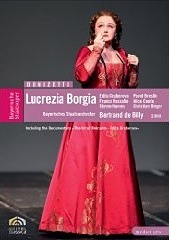
Christof Loy’s dreamlike, pared-down production of Donizetti’s 1833 masterpiece Lucrezia Borgia, created for the Bayerischen Staatsoper, is brought to life on Medici DVD
from performances in July 2009.
The DVD of the performance is accompanied by another hour-long DVD, The Art of Bel Canto: Edita Gruberova, which includes some fascinating rehearsal and performance footage of the Slovakian diva, accompanied by the effusive praise of various producers and music critics.
Loy’s production opens on a bare, grey stage with the name “Lucrezia Borgia” on the center wall in lighted letters. The only props are straight-backed IKEA-ish chairs and tables. One assumes the production style is meant to focus the audience’s eye on the personal relationships of the opera rather than the trappings of early 16th century Venice and Ferrara, and to a certain extent that notion succeeds.
There is no attempt at a specific period in the costumes. The Venetian soldiers led by Gennaro and Maffio Orsini are presented in identical black suits, thin ties, and rolled-up black pants, creating an image that reminded me of the young toughs of A Clockwork Orange. In an interesting “boys 2 men” moment, they all rolled their pants back down as they told of the horrors inflicted upon them by the Borgias.
Loy careers wildly off course with the first scene of Don Alfonso (a solid if misdirected Franco Vassalo) and his agent Rustighello (Emanuele D’Aguanno), when the Don establishes his jealousy and seeks Gennaro’s arrest. Inexplicably, this scene is played as a comic lazzi reminiscent of J. Pierpont Finch in How to Succeed in Business Without Really Trying —lots of spit shining of the boss’s, shoes, and even the old “spotlight’s missing the singer” bit. It really, really doesn’t work, reducing the dangerous and threatening Alfonso into a cruel buffoon. The following scene of Alfonso defying Lucrezia and insisting on the poisoning of Gennaro is thus emasculated.
It must be assumed that the raison d’etre of this production is Loy’s collaboration with the great soprano Edita Gruberova, fresh from their recent work on Roberto Devereux, where Gruberova plays Elisabetta as a Margaret Thatcher-ish leader. Lucrezia seems to me a less compatible character for Gruberova, both vocally and histrionically. Her first entrance is promising —she arrives in a flattering red gown to discover the sleeping Gennaro, and, in “Come bello”, all guns are blazing on every ship in her considerable vocal flotilla. An idiosyncratic singer capable of a huge variety of vocal dynamics and colors, even at age 63, she retains the ability to start a thread-thin pianissimo, then ever so slowly build the heft and volume until it soars over the orchestra. She attacks nearly every note in a different way, always the consummate musician.
But time is beginning to catch up. These vocal fireworks that once seemed natural and easy have become effortful and calculated. Both the bottom and top notes are now a struggle in this role, and the soprano tires noticeably in the final scene. We have stopped raving, “Isn’t she amazing?”, and now begin to ask “Isn’t she amazing — for her age?” I’m sad to report that her final interpolated E-flat at the end of her “mad scene” comes out as a curdled scream. And it doesn’t help that Loy has costumed her here as a witch in a Morticia Addams wig, an element that reappears in other Loy productions.
The supporting cast is quite strong. Tenor Pavol Breslik portrays a boyish and befuddled Gennaro. His is a splendid lyric voice, and his handsome looks and fine acting are impressive. His last scene with Lucrezia, when he learns his Borgia parentage and chooses death over betraying his friends, is particularly touching. Alice Coote’s tough, gutsy Maffio Orsini is very fine throughout, turning sensitive and tender in the scene where Orsini and Gennaro swear to live and die together. The production tastefully implies their “friends with benefits” relationship, aided by the pair’s genuine and moving performances. Both Breslik and Coote bring bravura singing to their roles.
Vassalo does his best, singing bravely and stylishly, burdened by Loy’s buffo interpretation. Bertrand de Billy conducts with fine forward propulsion, though the volume stays too long at one level, so climaxes are a bit anemic.
This opera has worked wonderfully well in the hands of divas like Montserrat Caballe, Leyla Gencer and Mariella Devia. In this difficult role of loving mother vs. vengeful poisoner, Gruberova has a qualified success. The production is visually fascinating, but begs the question: “Is this all a dream? Whose dream? Lucrezia’s? Gennaro’s?” Director Loy remains frustratingly ambivalent.

























Comments